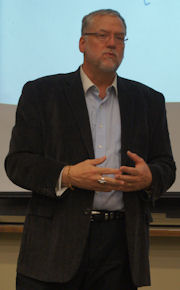by James A. Bacon
If you want to move green initiatives forward in the Richmond region, it’s best not to invoke “sustainability,” a word that quickly gets tangled in the controversy over global warming and inflames the anti-Agenda 21 element of the conservative movement. Instead, advises Daniel K. Slone, focus on concepts in which the interests of environmentalists align with those of business and local government. Talk about “resilience,” “ecodistricts” and “biophilia.”
Other regions are advancing environmental goals under these new headings, said Slone, a McGuire Woods attorney who works nationally with developers on smart-growth projects, serves on the board of the Congress for New Urbanism and is counsel to the U.S. Green Building Council. “You’ll hear those words more,” he told an audience of University of Richmond students as part of a speaking series sponsored by the law school’s Center for Environmental Management.
The idea of resilience came to the fore after Hurricane Sandy showed the vulnerability of New York’s electric power infrastructure and disrupted industrial supply chains. While Hurricane Katrina devastated New Orleans, many could write off the Big Easy as an economic backwater. But when New York experienced cascading disruptions, corporations and urban planners paid notice.
The big insurers are paying bigger claims for business disruption after Sandy than for damaged facilities, said Slone. Some are working on rate structures in which insurance fees vary by how resilient an organization is. Lenders are focusing on the issue, too, reviewing their exposure to the hurricane-vulnerable coast of Florida, for instance. Businesses, already sensitive to supply-chain disruptions caused by the Fukushima earthquake, are paying closer attention as well.
Dropping off the grid with a house powered by solar panels, the dream of some environmentalists, is not resilient — lose your solar panels from a falling tree and you have no electricity. The way to increase resilience, said Slone, is to create redundancy and multiple paths. When corporations think about where to locate, they may want resilient transportation systems. A system entirely dependent upon the automobile is less resilient, he argued, than a system in which employees live within walking distance or can reach the office by bicycle.
Slone pitched the idea of urban eco-districts as a way for enterprises to reduce the cost of water and waste water services. In the past, he worried that the suburbs might supplant the inner city as a locale for green development. After all, it takes less money to develop a green-field project. But densely populated urban areas can turn their drawbacks, such as a high volume of storm water runoff, into assets. Enterprises can spend less money on water and waste-water utilities by harvesting rain water and recycling gray water and run-off. Green roofs can lower HVAC costs and density can create better walking environments. “That has a lot of appeal to folks making decisions now.”
Thirdly, people like green, growing things, and they are willing to pay a premium to be around them. According to the Urban Land Institute, Slone said, properties adjacent to parks enjoy a 10% price premium. He cited the example of Singapore, which has built a walkway on land too hilly to construct buildings upon, lit up the structure at night and integrated solar-generating and water-harvesting structures that have gained international renown as architectural icons.
“Richmond will get there,” Slone said. “We just can’t talk about it in the same terms.” In Virginia, the key words are “competitiveness,” “flexibility” and “entrepreneurial opportunity.” But they can lead to the same place.



